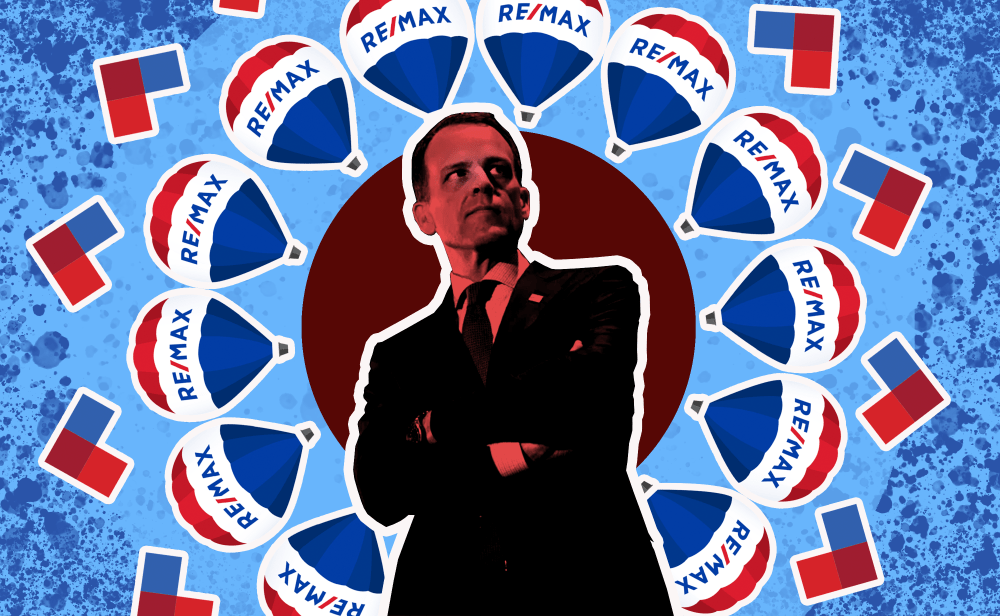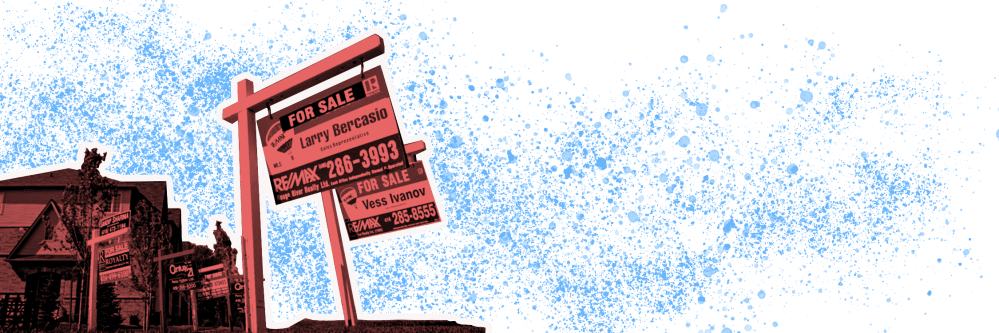
WHEN YOU THINK OF AN INTERNET SPAT between two opposing viewpoints, you probably wouldn’t expect a crown insurance lending corporation and a few major real estate companies to be at the center of it. Then again, you also probably wouldn’t expect an unprecedented global pandemic of COVID-19’s scale, which was enough to push the Canadian Mortgage Housing Corporation (CMHC) to change its tone on the real estate outlook. You also wouldn’t expect an outspoken figure quite like CMHC’s CEO, Evan Siddall, to acerbically lead the tone shift of this staid corporation, but with a final few months in his tenure and many things to say, the gloves are off.
No one could argue that the COVID-19 pandemic hasn’t had a severe impact on the global economy, leaving virtually no country spared from a surge in unemployment, a GDP plunge and stagnant consumption. About 5.5 million Canadians were either out of work or had their hours so dramatically reduced that they were struggling to meet their bills. This led to 8.41 million unique applicants to the Canadian Emergency Response Benefit (CERB).
The nosediving change in monthly employment in April alone (losing just shy of two million jobs) utterly dwarfed that of the 2008/09 recession (losing roughly 124,800).
A downturn of this size prompts the million-dollar question: will this be the crisis that pops the real estate bubble?
For the real estate bears, the COVID crisis is practically the moment they were waiting for, arguing that the sheer drop in job numbers and pause on immigration couldn’t possibly fuel the housing market up even further. Bulls, on the other hand, argue that with the lowest interest rates in recent memory and the tide of job losses disproportionately impacting renters and service industry workers (who probably weren’t in the market, anyway), house prices would either continue to hold or have a modest correction at best – nevermind the ever-growing 176.9% household debt to disposable income elephant in the room that has never been addressed during the last crisis.
Professionals and companies in the real estate sector were optimistic, and the Canadian banks timidly predicted a single-digit decrease that wouldn’t last long – Scotiabank’s report even called fears “overblown”.
In May, CMHC released a prediction of its own, and it went right for the jugular.

IN A ZOOM MEETING with the parliamentary committee of finance, Evan Siddall presented the most pessimistic outlook market watchers heard during this crisis: house prices could drop as much as 18% in the next 12 months. It’s a figure you might expect to see on a Canadian finance Twitter thread, but it came from the head of the CMHC.
“The resulting combination of higher mortgage debt, declining house prices and increased unemployment is cause for concern for Canada’s longer-term financial stability, ” Siddall explained, adding that the organization estimates that 12% of mortgage holders chose to defer their payments. By September, they anticipate this figure will reach 20%.
Siddall is known for having a sharp, honest tone, particularly compared to others who held the position before him. In recent years, there’s been a rise in Canadian financial authorities with a more down-to-earth communication style. Not unlike former Bank of Canada governor Stephen Poloz, Siddall has an open approach to speaking with the media and the public about CMHC policy changes and explains in very graspable detail the reasons behind its policies.
There’s honest, and then there’s brutally honest, direct, and blunt. The real estate watchers were reeling.
RE/MAX was the first notable voice speaking against Siddall’s outlook, with executive vice president Christopher Alexander calling the statement “panic-inducing and irresponsible”. In their report, they offered a lean explanation to combat this perspective, alluding to the meeker bank outlooks and simply stating that “demand is still high, and multiple offers are a common scenario.”
At the beginning of the year, RE/MAX was calling for a 3.7% growth in house prices. Now that COVID-19 is turning the economy on its head, they’ve changed their tone to say that house prices will either stay relatively stable or “experience a single-digit price correction at worst this year.”
A handful of independent media outlets gave a platform to RE/MAX’s claims. Even the Canadian Real Estate Association (CREA)’s doubt about CMHC’s predictions in an interview with Financial Post were pretty muted, though drove a 37 to 31 dislike to like ratio and a rash of negative comments on YouTube. Bottom line, people are taking these viewpoints with interests in the real estate market with a grain of salt.
Faced with this smearing in the press, most CEOs or policy markers would probably stay quiet. Siddall isn’t like most CEOs:
Not naming names, but everyone keeping up with the spat needed no further explanation.
“Please question the motivation of anyone who wants you to believe prices will go up (yes, up) with our economy in slow motion, oil being given away, millions of Canadians on income support and a greater % of mortgages not being paid than we’ve seen since the Great Depression,” Siddall continued in the thread.
I covered the story for Yahoo Finance Canada and spoke with a few experts in the real estate industry, including my friend Ron Butler, a mortgage broker with his own firm, Butler Mortgage. Butler commended Siddall on his ‘never-back-down’ attitude, adding his own blunt perspective on RE/MAX’s single-digit correction: “It’s literally irrational,” he told me, mentioning that there was a double-digit drop in Greater Toronto Area (GTA) house prices in 2017 when times were good, “There was no economic reflection point, no economic disaster or even a problem – how in the world do you declare single-digit change for COVID? The only word you can use is irrational.”
In 2017, it was a simple case of an over-heated market seeing a correction. This year ran prices up to those same 2017 highs, making it a déjà vu for real estate bears.
The economic prospects are grim, but many market analysts were left scratching their heads and asking: what exactly was the CMHC seeing that the rest of us didn’t?

On June 4, the CMHC once again had real estate enthusiasts gawking: they announced tight new lending measures that are expected to make it more difficult for Canadians – particularly first-time home owners – to get into the market. Here are the changes:
- One applicant’s credit score must be a minimum of 680 (up from 600)
- Total debt service ratios will now be 42% (down from 44%)
- Gross debt service ratios now must be 35% (down from 39%)
After these measures go into effect on July 1, home purchases will be harder for a group of people pulling every possible stop to get in the market, putting a wrench in the “real estate prices will stay steady” narrative that the bulls were boasting about. If the CMHC had this lending change priced into their housing outlook, then it was no wonder that it was so negative. After all, it’s probably easier to make an 18% price drop bet when you’re holding the aces*.
This elicited a scatterplot of reactions from the brokers and the macroeconomic analysts I spoke with when I wrote the reaction piece, but the one consensus was that the change would probably have buyers flocking to the market to get approved for a mortgage in that tight window. Some brokers criticized the move for ‘intervening in a free market’, a claim that had no sympathy with Ben Rabidoux, president at North Cove Advisors Inc.: “The entire mortgage lobby has a direct federal guarantee and multiple layers of direct federal guarantees that subsidized them, so cry me a friggin’ river… The government from time to time has the right and should be re-evaluating their position given the changing risk landscape. That’s how that’s supposed to work. It’s not a free market.”
At the end of the day, the CMHC is a lending business, and they will adjust their qualifications to reduce the risk to said business. In an economic environment where there’s over 8 million benefits claimants, industries being decimated, and immigration stalled, there’s a good reason for a company to be more wary in taking on high risk.
While CMHC set this standard, the private mortgage insurance companies did not follow this mandate. Genworth MI Canada Inc. and Canada Guaranty announced shortly after CMHC’s changes that they were not planning to make changes to their underwriting policy, presenting a bit of a work-around for the non-qualifying there.
All things considered, this summary is being published on a week when Canadian home sales jumped a record 56.9% in May. It’s still the worst showing for the month of May since 1996, but it shows that there’s activity in the market despite all the challenges against it. It’s hard to put a finger on what exactly is driving transactions at this point, especially with the labour market carve-out and the dismal global economic outlook. Maybe it’s a temporary boost before we start to see the data resembling that of the CMHC outlook, maybe the Canadian housing market truly is the unstoppable freight train that the bulls insist it is. In any case, when the considering the stability of the housing market, it’s always worth looking into history and asking yourself, is this time really different?
Updated comments from Evan Siddall:
*“Our underwriting changes were not a factor in our price outlook. In any event, our estimate is that they will have an effect of < 0.5% on average house prices in (Canada)” – Evan Siddall
